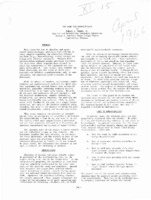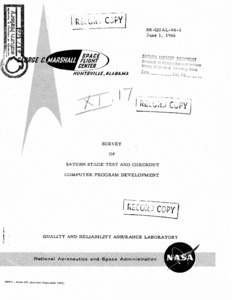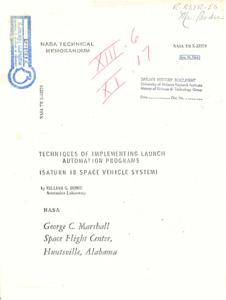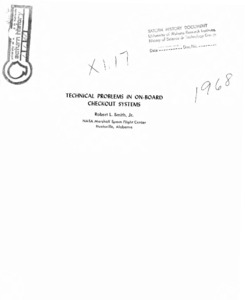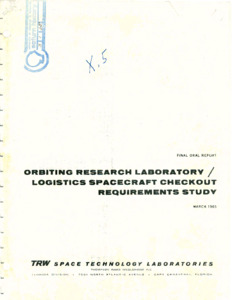
Browse Items (5 total)
Sort by:
-
"The Case for Compatibility."
"The Case for Compatibility" is a paper by Robert L. Smith, Jr., who worked in Quality and Reliability Assurance Laboratory at George C. Marshall Space Flight Center. The summary states, "Ever since the use of missiles and space launch vehicles began, questions have existed in every program regarding the similarity between upstream (e.g., manufacturing, static firing ) and launch site checkout equipment. Programs have existed which utilized nearly identical equipment for both uses; other programs have existed in which any resemblance of the equipment was probably coincidental. Many factors have entered the final decisions, not the least of which were economic and schedule considerations, and, in some instances, the organizational structure of the developer." -
"Survey of Saturn stage test and checkout computer program development."
This survey of the Saturn Stage Test and Checkout Computer Program Development contains a summary description of the systems developed for factory and static test of the stages of the SATURN IB and SATURN V Vehicles. The responsibilities of the MSFC and stage contractor organizations that are involved in test and checkout computer program development are briefly described. The test and checkout hardware and software (computer program) systems are given for each stage and for each site where tests are conducted. The systems and procedures that are used for program production verification, documentation, and change control required for the implementation of planned computer programs are included. Notes are included in the report to indicate what material is missing or incomplete. No attempt has been made to draw any conclusions regarding the automatic test and checkout systems being developed for each stage and the manner in which the efforts are organized, scheduled, and implemented. This document has been based on material provided by stage contractors and by components of MSFC through May 1, 1966. COMPUTER SYSTEMS SECTION. VEHICLE SYSTEMS INTEGRATION BRANCH. VEHICLE SYSTEMS CHECKOUT DIVISION.; SR-QUAL-66-3. -
"Techniques of implementing launch automation programs" (Saturn IB space vehicle system).
This paper identifies the methods and equipment through which automation is becoming a major factor in testing and launching Saturn IB space vehicles. The merits of a digital guidance computer and its impact in extending automated checkout are stressed; also a logical basis is established for computer and manual test control. Hardware and software elements of the automated system are described, and details pertaining to reliability are emphasized. A concluding appraisal suggests that automation will play an expanding role in future test and launch operations. -
"Technical problems in on-board checkout systems."
For the purposes of this paper, an onboard checkout system is defined as a system which is built into prime flight equipment, flies with it, and permits a checkout capability to exist during all the major phases of the test and mission life of that prime equipment. Varying degrees of capability may exist in such a system, depending on what is designed into it. This, in turn, is generally dependant on life and mission requirements of the prime equipment, degree of mission checkout required, reliability restrictions,redundancy levels, data management scheme, and equally important, state of the art . Not all checkout can be accomplished with onboard equipment. Mechanical system problems such as leak detection, for example, require techniques that cannot be remotely controlled and evaluated today. On the other hand, such things as in-flight telemetry have been used for quite a long time and will continue to be used for onboard checkout. -
"Orbiting research laboratory/logistics spacecraft checkout requirements study."
This report presents the results of the study of Orbiting Research Laboratory and Logistic Spacecraft Checkout Requirements as they relate to prelaunch operations at MILA. The study was performed jointly by the Florida Division and the Systems Research and Analysis Division of TRW Space Technology Laboratories for NASA under the terms of contract NAS10-1076.
